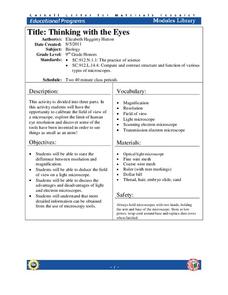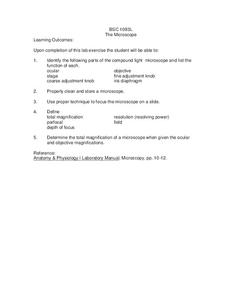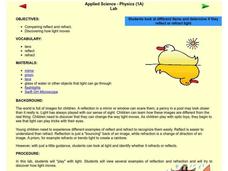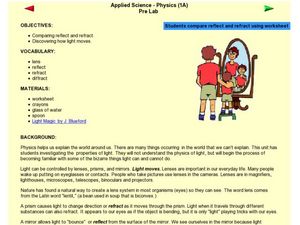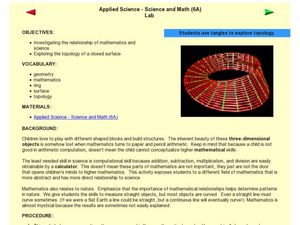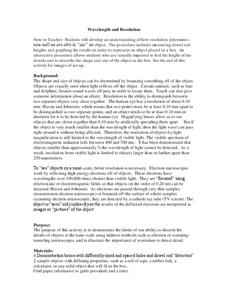Curated OER
Exploring Microscopes
Students explore the parts of a microscope. For this microscope lesson, students examine simple and compound microscopes. Students discover how the parts of a microscope work together to generate an image.
Cornell University
Thinking with the Eyes
Objects are larger (or smaller) than they appear! Scholars use a laboratory investigation to explore the difference between resolution and magnification. The activity allows them to calculate the size of the field of view of their light...
Curated OER
Microscopes
In this microscope worksheet, students complete a word search by finding the 22 terms associated with the parts of a microscope.
Curated OER
Microscopes Online
In this microscopes worksheet, students access a website to complete questions about the early compound microscopes and the scientist involved in the development. This worksheet has 1 graphic organizer, 7 fill in the blank, and 10 short...
Curated OER
Microscopes and Telescopes
Students analyze a microscope and study what they do. In this investigative lesson students study how microscopes were first invented, and how ray diagrams are used in conjunction.
Discovery Education
Fuss About Dust
Dust is everywhere around us; it's unavoidable. But what exactly is dust and are certain locations dustier than others? These are the questions students try to answer in an interesting scientific investigation. Working independently or...
Curated OER
Cells: The Units of Life
In this cells worksheet, 9th graders identify and use a microscope to look at cells. They explain the purpose for a microscope and how to find the total magnifying power of a microscope. Students also determine what would cause an image...
Curated OER
A View of the Cell
In this viewing of a cell instructional activity, students will read a paragraph about how microscopes work and will use a diagram of a light microscope to complete 2 short answer questions.
Curated OER
Introduction to Biology
Learners examine a microscope and learn its functions. In this microscope instructional activity students prepare a wet mount slide and complete calculations.
Curated OER
The Microscope
In this microscope lesson students explore the compound light microscope. Students discover techniques concerning cleaning, storage and proper use of the microscope. Students discover the working parts of the compound light microscope as...
Curated OER
Zoom into Microscopy
Learners discover proper microscope use. In this microscopy lesson, students create picture books that show the detail of organisms as seen with the human eye, through a hand lens, and at each power of the microscope.
Curated OER
Applied Science - Physics Lab
Young scholars define reflection and refraction. In this Physics lesson, students compare a variety of items to find properties of reflection or refraction. Young scholars record their findings.
Curated OER
Fiber Identification
Lab sheets for three different crime scene investigation activities are tucked into this resource. In the first activity, inquisitors examine a variety of fibers, including the fiber found at "the crime scene," under ultraviolet light....
Curated OER
Reflect and Refract
Young scholars explore light. In this properties of light lesson, students define the terms refract, reflect, and diffract after listening to the teacher's description. Young scholars listen to the book Light Magic and observe a spoon in...
Curated OER
Applied Science-Science and Math Lab
Young scholars explore magnification. In this scientific observation skills lesson, students observe sea life items and draw pictures of what they observe. Young scholars predict which lens will have the strongest magnification when...
Curated OER
Salt: Up Close and Personal
Students predict, observe, and explain the details of salt as they view it under a variety of magnifications. They observe salt with the naked eye, and then under a hand lens, microscope, and the electron microscope.
Curated OER
What Kind of Insect is That?
Fifth graders characterize insects and classify insects according to the Linnaean system. They use hand lenses or microscopes to examine insect body parts.
Curated OER
Cells All Around
Students measure the size of an epithelial cell and to estimate the number of epithelial cells in a given area of the body. After watching a video on cells, student groups perform an experiment using a microscope to view some of their...
Curated OER
What to Do with a $20 Bill Besides Spend It
Students explore the concept of anti-counterfeiting measure. In this economics instructional activity, students use science equipment to discover anti-counterfeiting designs. Students then explore other denominations of bills.
Curated OER
A Distant View
Students investigate the essential concepts of how lenses work to magnify vision, and then build simple telescopes to demonstrate their understanding. They write a description of how their telescope could be improved and how it works.
Curated OER
Life in a Forest Stream
Students assess macro-invertebrates from a stream. In this science lesson plan, students observe, classify and identify organisms found in a stream. A lab station is constructed at the stream sight and students study the different...
Curated OER
Light and Optics
Third graders utilize the scientific method to explain light and optics in this five lessons unit. Through experimentation and discussion, 3rd graders canvass the concepts of light traveling, reflection and refraction.
Curated OER
Hey, Look Me Over!
Students make observations about mealworms using hand lenses, rulers, and cotton swabs. Students complete their own mealworm observation chart, then they share their observations with the class. This is one station out of five in an...
Curated OER
Wavelength And Resolution
Pupils perform a simulation of the workings of an electron microscope to discover that the resolution will need to improved to detect objects in the nano-scale. They use wooden dowels as detectors to determine the shape of objects in...



